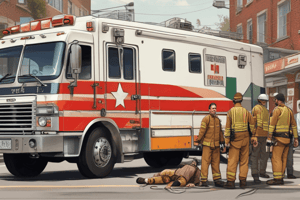Podcast
Questions and Answers
What is the primary purpose of triage in emergency care?
What is the primary purpose of triage in emergency care?
- To determine the urgency for treatment (correct)
- To perform surgical procedures
- To provide long-term treatment plans
- To evaluate patient satisfaction
Mucous membranes are assessed in both respiration and perfusion evaluations.
Mucous membranes are assessed in both respiration and perfusion evaluations.
True (A)
What does CPP stand for in the context of head trauma assessment?
What does CPP stand for in the context of head trauma assessment?
Cerebral Perfusion Pressure
The normal rectal temperature is considered to be _____ degrees Celsius.
The normal rectal temperature is considered to be _____ degrees Celsius.
Match the following assessments with their focus:
Match the following assessments with their focus:
Flashcards are hidden until you start studying
Study Notes
Triage
- Initial step for evaluating the urgency of treatment and necessary interventions.
Respiration
- Assessment includes airway patency, respiratory rate, effort, and pattern.
- Examination of mucous membranes for color and moisture.
- Use of pulse oximeter to measure oxygen saturation levels.
Awareness
- Conscious Assessment:
- Yes: Can be alert, depressed, or delirious.
- No: Can present as stuporous or comatose.
Secondary Assessments
Perfusion
- Evaluate mucous membranes for color and hydration status.
- Check peripheral pulses for strength and regularity.
- Conduct heart auscultation to assess heart rate, sounds, and rhythm.
Pupil Assessment
- Test pupillary light response to assess neurological function.
- Identify conditions like miosis (constricted pupils) or mydriasis (dilated pupils).
- Assess for oculocephalic reflexes and presence of strabismus or nystagmus.
Head Trauma
- Monitor cerebral perfusion pressure (CPP): CPP = mean arterial pressure - intracranial pressure.
- Ensure adequate oxygenation.
- Address blood pressure under treatment (BPU).
- Identify and manage hypovolemia.
- Maintain head elevation at 30° to optimize intracranial pressure.
Sepsis
- Identify signs of sepsis, including a rectal temperature at or above 74°C.
Studying That Suits You
Use AI to generate personalized quizzes and flashcards to suit your learning preferences.




